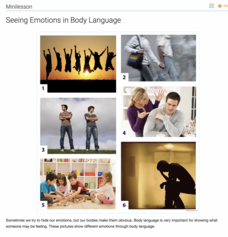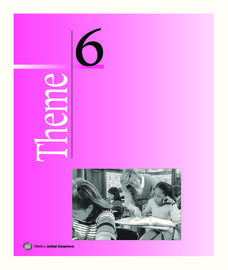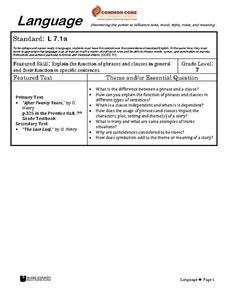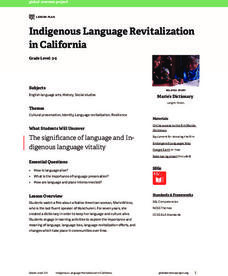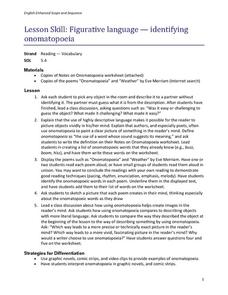British Council
Learning English through Short Stories
Use short stories to teach English? Yes! Designed as a professional development opportunity for English language teachers, the ideas in this booklet can easily be adapted to advanced ESL/ELL classes.
TED-Ed
How Languages Evolve
Do all languages have a common ancestor? Although no one yet knows the answer to that big question, the narrator of this short, animated video explains how linguists use migration patterns, geological features, and word clues to...
PBS
Their Eyes Were Watching God: The Impact of Language
Author, filmmaker, and anthropologist Zora Neale Hurston was also a dialectologist. The dialogue of the characters in her novel Their Eyes Were Watching God reveals her fascination with accents and dialects. A short video from the Great...
American English
Welcome to the Color Vowel Chart
Focus English language learners' attention on word stress and phrase stress with a pronunciation chart that breaks the sounds into moving and non-moving vowel sounds. The chart tool uses colors and key words to indicate where to put the...
K20 LEARN
My Love Is Like Figurative Language: Figurative Language in Romeo and Juliet
My love is like an anaconda. Huh? Scholars investigate similes, metaphors, hyperbole, and personification used by writers to express feelings. They examine lyrics from songs and lines from Romeo and Juliet and consider how the use of...
Star Wars in the Classroom
"Shakespeare and Star Wars": Lesson Plan Day 3
To make the point that there are many forms of language, each with its own purpose, class members select 10 lines from Doescher's play, translate these lines first into contemporary English and then into "SMS/Tweet."
Los Angeles Unified School District
Tools for ESL Lesson Planning
Whether you are new to teaching language learners or an experienced pro you will find much to like in this massive tool kit. The 195-page packets contains teaching tips and tools, sample lesson plans and activities, worksheets and...
Thoughtful Learning
Seeing Emotions in Body Language
Scholars test their skills of reading body language with a collaborative learning experience that focuses on showing and identifying emotions. Pairs take turns acting out an emotion, one uses body language while the other guesses what...
PBS
Robot Body Language
How can you tell what someone is feeling when they aren't saying a word? Explore non-verbal communication with an activity based on Cynthia Breazeal's work with expressive robots. One learner puts a bag over his or her face and uses body...
Houghton Mifflin Harcourt
Heroes: English Language Development Lessons (Theme 5)
This packet of support materials for the Houghton Mifflin Harcourt thematic units on heroes, contains lessons, exercises, and activities specifically designed for ELD/ESL learners.
Houghton Mifflin Harcourt
Amazing Animals: English Language Development Lessons (Theme 4)
This packet, the second in the series of support materials for the Houghton Mifflin Harcourt thematic units on amazing animals, contains exercises and activities designed for the ESL/ELD classroom.
Houghton Mifflin Harcourt
Animal Encounters: English Language Development Lessons (Theme 6)
Denali National Park and the rain forests of Brazil are the settings for a series of lessons on animal encounters with grizzly bears and golden lion tamarins. The 32-page packet includes scripted lesson plans, activity suggestions, and...
EngageNY
Reading Shakespeare: Understanding Shakespeare’s Language
Pupils participate in a drama circle to read Shakespeare's A Midsummer Night's Dream aloud. They work with partners to discuss Shakespeare's use of language and analyze how specific lines of dialogue within the play help propel the...
Curated OER
Focus on Figurative Language
Using the poems "First Snow" by Ted Kooser and "Eating Alone" by Yi-Young Lee (or other suggested poems by Robert Frost or Sara Teasdale), middle schoolers search for examples of figurative language. Guide your learners by discussing...
Forum
A Research Toolkit of 12 Reading Strategies for the Foreign Language Classroom
Learning to read is not a simple task, but there are methods for assisting pupils as they develop literacy skills. The first four pages of this resource include information about language development and reading development, as well as...
Curated OER
The Use of Language in "I Know Why the Caged Bird Sings"
Readers of I Know Why the Caged Bird Sings are asked to craft an essay in which they compare how Maya Angelou uses figurative language to depict herself and Mrs. Flowers.
Curated OER
Shakespeare's Othello and the Power of Language
Students read and analyze Iago's rhetoric in specific monologues and dialogues with other characters, examine what Iago says and how he says it, define some basic rhetorical terms, and discover the sometimes dangerous power of language.
Global Oneness Project
The Importance of Indigenous Language Revitalization
Middle schoolers consider languages as representations of cultures and the importance of preserving various languages, especially the rapidly disappearing languages of indigenous peoples, in a lesson that tells the story of Marie Wilcox...
Wake County Public Schools
Language
Have your class doing everything from reading literature, analyzing literary devices, identifying independent and dependent clauses, discussing, and writing creatively with the rich resource found here. After a mini lesson on independent...
EngageNY
End of Unit Assessment: Presentation of Position
What is the difference between formal and informal language? Pupils rewrite their position speeches to adapt them for an audience of adults. Next, they present their speeches in small groups, attempting to answer the question, "Which...
PBS
Explicit and Implicit Language – Interpreting the Meaning of the Fourteenth Amendment
How do Supreme Court justices interpret amendments to the Constitution? The resource helps answer that question by discussing how people use explicit and implicit language to interpret the meaning of the Fourteenth Amendment. Learners...
Global Oneness Project
Indigenous Language Revitalization in California
A film showcases a Native American woman and her hard work to create a dictionary detailing her tribe's language. While viewing, scholars reflect upon and discuss the importance of language and sustaining cultural identity.
Curated OER
Figurative Language- Identifying Onomatopoeia
A study of onomatopoeia for 5th graders is here for you. Pupils discover that the use of highly descriptive language makes it possible for readers to picture objects in their minds. After engaging in a class discussion and listening to...
Curated OER
The Sound of…Poetry!
Scritch, scratch, scritch. It's the sound of pupils writing poetry! Focus on sensory language and onomatopoeia with a writing lesson. After listening to some sounds, learners examine a couple of poems that include sound words and then...
Other popular searches
- Foreign Languages
- Foreign Languages Spanish
- World Languages
- Foreign Languages French
- Foreign Languages Italian
- Cultural Languages
- Foreign Languages German
- Foods Foreign Languages
- Languages" | "Foreign Language
- Languages Foreign Language
- Foreign Languages Directions
- Foreign Languages Animals









